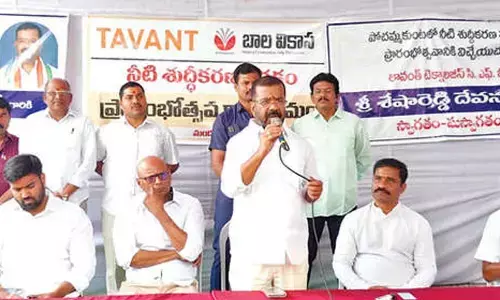Guidelines and curriculum framework ready for environment education at undergraduate level

The guidelines and curriculum framework for environment education at the undergraduate level has been prepared
The guidelines and curriculum framework for environment education at the undergraduate level has been prepared.
As par the draft guidelines, there will be a six-month compulsory core module course in environmental studies for undergraduate students. The duration of the course will be 50 lectures. The exams will be conducted along with the annual examination.
The UGC had constituted an expert committee for the draft guidelines and curriculum framework, which has prepared its report. The report will soon be in public domain besides being shared with all the universities.
The core module syllabus for environmental studies includes class room teaching and field work. The syllabus is divided into eight units covering 50 lectures. The first seven units will cover 45 lectures which are class room-based to enhance knowledge skills and attitude to environment.
Unit eight is based on field activities which will be covered in five lecture hours and would provide students first-hand knowledge on various local environmental aspects.
UGC Chairman M Jagadesh Kumar said that environment education needs to include areas such as climate change, pollution, waste management, sanitation, conservation of biological diversity, management of biological resources and biodiversity, forest and wildlife conservation, and sustainable development.
Earlier in 2003, the UGC had come out with a core module syllabus for compulsory implementation of environmental studies at the undergraduate level as per the directives of the Supreme Court.
In 2017, the UGC had framed an eight-unit module syllabus for the ability enhancement compulsory course (AECC-Environmental Studies) under the choice based credit system (CBCS), Kumar said.
"The present document is an outcome of the UGC's initiative to implement the National Education Policy 2020, which has emphasised the need to formulate guidelines and curriculum framework for environmental education. The document is expected to cater to students from diverse disciplinary backgrounds and also includes topics to sensitise students about the commitment of the nation towards achieving sustainable development goals," Kumar said.
The expert committee of UGC recommended that field experience is one of the most effective learning tools for environmental concerns. This moves out of the scope of the text book mode of teaching into the realm of real learning in the field, where the teacher merely acts as a catalyst to interpret what the students observes or discovers in their own environment. Field studies are as essential as class work and form an irreplaceable synergistic tool in the entire learning process.
The universities and colleges can also draw upon expertise of outside resource persons for teaching purposes. The environmental core module shall be integrated into the teaching programmes of all undergraduate courses.
Continuing problems of pollution, loss of forests, solid waste disposal, degradation of the environment, issues like economic productivity and national security, global warming, the depletion of the ozone layer and loss of biodiversity have made everyone aware of environmental issues. Kumar said that, out of the 17 sustainable development goals (SDGs), six are directly linked to environmental protection and resource conservation.










